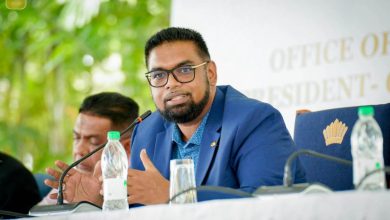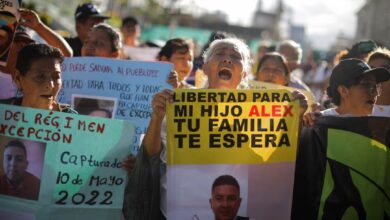News
Caribbean RoundUp

ANTIGUA
The Antigua and Barbuda government says it has not received any official communication from Britain regarding two yachts docked in Antigua which international media claims belong to Roman Abramovich, the Russian billionaire owner of English football club Chelsea.
Minister of Information, Melford Nicholas told reporters that Attorney General Steadroy Benjamin has not received official documents from London “in pursuit of this particular matter.”
Abramovich is among several Russian billionaires identified by Europe and North America for sanctions as a result of their close relationship with Russian President Vladimir Putin who sent troops into Ukraine last month.
Nicholas said there were options open to the government should it receive a request from London to ensure that the yachts are not allowed to break the sanctions.
He said if there is any requirement for the UK government to pursue these boats,”we may just ask them to leave our borders.
British media reports said that the two yachts, while they are registered to a firm in the British Virgin Islands, could most likely be the property of Abramovich, who is seeking to sell his English football club.
They said London has asked Antigua for assistance in forcing sanctions against him, but that the matter is proving to be complicated including the need for a court order to determine the owners of the yachts.
Antigua and Barbuda’s ambassador to the US, Sir Ronald Sanders, speaking on a British television program, spoke of a letter from the British Virgin Islands authorities indicating that Abramovich was the beneficial owner of the company which the yachts are registered.
BARBADOS
United Nations Secretary General, Antonio Guterres has announced Prime Minister Mia Mottley of Barbados and Prime Minister Justin Trudeau of Canada as new co-chair of the Sustainable Development Goals (SDG) Advocates group.
The UN secretary general said the Sustainable Development Goals are the world’s blueprint to build a healthier, greener and sustainable future by 2030.
“Implementation of the 2030 Agenda for Sustainable Development by the end of the Decade of Action and Delivery on the Sustainable Development Goals,” said Mottley.
She has campaigned extensively for climate action and debt sustainability in middle-income countries and small states. In 2021, she was awarded the Champions of the Earth Award for her leadership.
The 17 Sustainable Development Goals aims to create a world that is fair, equal, and peaceful, with clean air and clean water for everyone.
CARIBBEAN
The Barbados-based Caribbean Development Bank (CDB) has released a series of creative industry (CI) profiles covering ten of its borrowing member countries (BMCs).
The CDB said that it’s Cultural and Creative Industries Innovation Fund (CIF) has released the CIF list, which was developed through a research consultancy in 2020 and provides valuable information on the resources available in the BMCs which are relevant to building a robust and globally competitive CI sector.
It said the countries profiled are The Bahamas, Barbados, Belize, Cayman Islands, Dominica, Guyana, Haiti, Jamaica, Suriname and Trinidad and Tobago.
“These profiles are useful reading for professionals, academics and practitioners working in or connected to the creative industry,” the CDB said.
It said additional information was obtained via survey of regional cultural industry practitioners and stakeholders, which were conducted for this project
GUYANA
The World Bank says Guyana’s economy grew by 72.03 percent between 2019 and 2021 and this is the largest growth rate in the Latin America and the Caribbean (LAC) region.
This was outlined in the World Bank’s semi-annual report for Latin America and the Caribbean, which was published recently.
The World Bank noted many countries in the region, particularly the tourism-dependent nations, recorded economic declines.
However, Guyana was among the 12 countries that recorded positive economic growth over the past two years and the country’s cumulative growth was the only one with a double-digit growth rate.
Nicaragua, the country with the second highest cumulative growth rate, grew around 7.53 percent.
The World Bank noted that although the country’s non-oil economy has been affected by the COVID-19 pandemic and climate-related challenges (flooding), the development of the oil economy, facilitated Guyana’s economic expansion.
Based on new growth projections, Guyana’s real GDP is expected to expand by 49.7 percent this year.
The trend of economic growth is expected to continue in 2023 with a 34.3 percent and a 3.8 percent growth rate.
In its Global Economic Projects report, released in January, the World Bank stated that Guyana’s growth projection for 2022 was 49.7 percent.
JAMAICA
Rwanda President Paul Kagame recently ended a three-day state visit to Jamaica signing two agreements that both countries said underscored the need for closer collaboration between the African country and the Caribbean Community (CARICOM).
The two countries signed a Memorandum of Understanding (MOU) on co-operation in tourism and a MOU on political consultation.
Jamaica Prime Minister Andrew Holness described his bilateral talks with Kagame as “critical on various issues of mutual interest.”
Holness told the ceremony that deepening relations with Africa has always been an area of focus for his administration and the Jamaica-Rwanda relationship since the establishment of diplomatic relations in November 1998.
Kagame told the ceremony that his discussions with Holness were “productive” and both leaders had agreed “there is no better time for Rwanda and Jamaica to deepen our relationship” as he too welcome the signing of the two MOU.
SURINAME
The Suriname government has approved the draft legislation for Value Added Tax (VAT), after years of delay.
The proposed law was presented to cabinet recently and after approval by the State Council, the draft will still have to be adopted by parliament before being implemented. It is expected that the introduction of VAT wlll take place on July 1.
During the first term of the administration of President Desi Bouterse in the period 2010-2015, the plan was conceived to switch from turnover tax to VAT in the country.
However, Bouterse also failed to get the VAT off the ground in his second term, from 2015 to 2020.
The introduction of VAT is now part of the economic reform that the Santokhi government is currently undertaking.
VAT has been the norm in the region and internationally for many years, and it is an important step towards a more modern tax system that creates more opportunities for economic stability and growth.
TRINIDAD
CARICOM has come together to inform the international banking system that its policies on banking in the region are unacceptable and there should be greater dialogue.
On his return to Trinidad and Tobago, Prime Minister Dr. Keith Rowley said the issue was of grave concern for the region that faced sanctions based on suggestions that the regional system was vulnerable to terrorists and money laundering.
Dr. Rowley was part of the CARICOM caucus at the Roundtable Discussion on De-Risking and Corresponding Banking, which was held last week in Barbados.
Rowley said he could not identify any specific bank that changed its mind on doing business in the region but highlighted that some international banks expressed concerns that they could be penalized heavily for interacting with regional banks accused of wrong doing.
So concerned are such banks that some have chosen not to do business with regional financial institutions.
He said the banks were seeking to avoid being funded for associating with banks identified as being in dangerous activities like money laundering and terrorist financing.
The Prime Minister said the “small man” could lose the ability to cash checks, send or receive money abroad or make credit-card purchases.
— Compiled by Azad Ali





